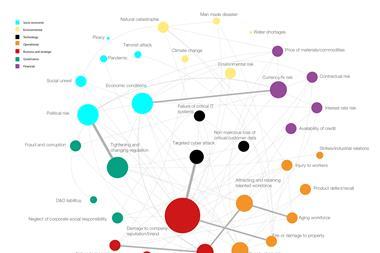A report finds the underwriting differences between London and Bermuda are thinning
Today, the Insurance Intellectual Capital Initiative (IICI) released its first report, finding that Lloyd’s and Bermuda represent distinct and different approaches to underwriting, but that their work practices and risk evaluation methods are showing signs of convergence.
Trading risk: The value of relationships, models and face-to-face interaction in a global reinsurance market, analyses the strengths and weaknesses of the reinsurance underwriting and broking practices of the Lloyd’s and Bermuda marketplaces.
Released in time for the Monte-Carlo Rendez-Vous, the industry-commissioned report also finds that each market can benefit from learning from the strengths of the other to reduce inefficiencies and redundancies at each stage of the process of writing a risk.
“Lloyd’s versus Bermuda is not a robust distinction. Stereotypes are exaggerated and overlook similarities between the markets,” said one participant in the study.
The report argues that the reinsurance industry has experienced three “profound” forces for change. Technological change has improved information distribution and strengthened connections between global markets, while regulatory emphasis on global equivalence in trading practices has generated pressure for convergence across different marketplaces.
Finally, the widespread acceptance of vendor property catastrophe models has led to more standardised approaches to the evaluation of reinsurance risks, levelling the playing field for decision-making on at least some classes of business.
“The generic findings show that a market built around a central physical location, such as Lloyd’s, is valuable for business that requires face-to-face contact at the point of decision-making,” says the report.
“However, much business can be transacted through selective use of face-to-face interaction at prior stages in the process, rather than at the ‘point-of-sale’. Bermuda is an example of such a ‘transportable’ reinsurance market; markets can be established where regulatory and taxation conditions are favourable rather than necessarily being bound to a particular physical location,” it says.
Drawing on the strengths of each marketplace, the report makes a set of recommendations for best practice at each stage of the trading process, offering a guide for reinsurance firms and broking houses to evaluate and change their current practices.
“The specific findings show how the selective use of face-to-face and electronic interaction can reduce inefficiencies and improve decision quality in either type of market,” the report concludes.
Professor Paula Jarzabkowski of Aston Business School notes that reinsurance trading needs to become more professional to accommodate these changes. “It is shifting from a ‘craft industry’ based on individual skills and relationships, to
transferrable skills and business-to-business relationships. The reinsurance industry has not always shown enough discrimination in either developing professional skills or pursuing business relationships. For example, it is important to choose skiing, golfing and sailing relationships on the basis of gaining access to preferred business partners, rather than because of personal conviviality”. The report makes recommendations on how to maximize value from a portfolio of business relationships, as well as how to improve the effectiveness and quality of reinsurance trading skills.
Bronek Masojada, CEO of Hiscox Ltd and Chairman of the Insurance Intellectual Capital Initiative said: “Reinsurance underwriting practices around the world are converging. The next differentiator will be the ability to move from ‘corner store’ management practices to those suited to multi-billion dollar global enterprises”.
Trevor Maynard, Deputy Head of Exposure Management at Lloyd’s, served on the IICI Steering group. He said: “We believe that behavioural issues can be significant when assessing risk, so Lloyd’s were delighted to help support this long term study. It is excellent that so many Lloyd’s market companies supported and valued this social research. Tracking subjective judgement to provide a trail of evidence is a key conclusion of the report which should help to monitor and mitigate behavioural risks.”
The data for the study was gathered from audio and video recordings of live trading of over 800 decisions and across competitors and markets during the 2009/10 reinsurance trading cycle. “This unprecedented level of access is a testament to the reinsurance industry’s willingness to examine its own practices,” the report authors said.
The year-long study was researched and produced by the Aston Business School, working with the Economic & Social Research Council. 17 insurance firms participated in the research, including Amlin plc, Aon Benfield, Arch Reinsurance Ltd, Ariel Re, Axis Reinsurance, Brit insurance, Hiscox plc, Kiln Group, Liberty Syndicate Management, Talbot Underwriting, Tokio Millennium Re, and Validus Re.



















